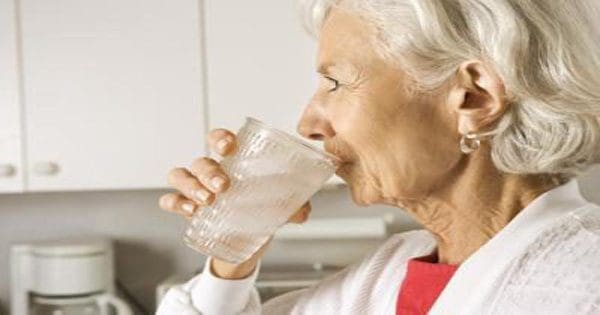Hydration is key to staying and feeling healthy. Your body has an intricate system of keeping fluids and electrolytes balanced, and proper hydration is a main component of this process. If this system is not functioning properly, you may suffer the dangerous consequences of dehydration. In the elderly, this regulation system may no longer function properly on its own, making dehydration more common — making adequate hydration even more important.
Table of Contents
The Importance of Hydration
Dehydration is a risk factor for increased morbidity and mortality, especially in the elderly. This condition can lead to hospitalization, infection, loss of cognitive function, and even death if not treated immediately. Due to changes in the body during aging, such as a decrease in total body water as well as a decrease in being able to sense thirst, dehydration can happen quickly in the elderly. Staying hydrated every day is the best way to prevent this.
Symptoms of Dehydration
Symptoms of dehydration include dry mouth, no urine or very concentrated urine, sunken eyes, lethargy, low blood pressure, rapid heart rate and dry skin. Symptoms of dehydration should not be overlooked. If you suspect that you are dehydrated, try drinking small, frequent amounts of fluids such as water. If your symptoms do not improve, call your doctor or go to the hospital, as severe dehydration may requires medical attention.
Daily Hydration Requirements
Water needs vary from day to day and from person to person. However, the general recommendation for fluids is at least 6 to 8 cups, or 48 to 64 fluid ounces daily. Your fluid needs may be increased if you are losing excess water through sweat or urine. As a rule of thumb, you should drink 4 ounces of water every 15 to 20 minutes during periods of excess loss.
Hydration Tips
Because the thirst mechanism in the elderly may be dysfunctional, focus on drinking small, frequent amounts of fluid throughout the day rather than waiting to feel thirsty. Water is the best option for hydration, but any fluids count toward the daily requirement. If you are drinking juice or soda, try mixing it with half a glass of water to cut down on the sugar and calorie content. Additionally, you can get fluids through foods such as soups, fresh fruits and vegetables, and ice pops.
Sourced from: livestrong.com
Hydration is important to ensure the proper function of all the structures in the body. When people age, the body’s normal amount of water decreases naturally, making dehydration more likely to occur. As a result, the proper hydration is much more important in older adults. By following several hydration tips, elderly patients can maintain the correct levels of water in their body to ensure their overall health.
For more information, please feel free to ask Dr. Jimenez or contact us at 915-850-0900 . 
Post Disclaimer
Professional Scope of Practice *
The information on this blog site is not intended to replace a one-on-one relationship with a qualified healthcare professional or licensed physician and is not medical advice. We encourage you to make healthcare decisions based on your research and partnership with a qualified healthcare professional.
Blog Information & Scope Discussions
Welcome to El Paso's Premier Wellness and Injury Care Clinic & Wellness Blog, where Dr. Alex Jimenez, DC, FNP-C, a board-certified Family Practice Nurse Practitioner (FNP-BC) and Chiropractor (DC), presents insights on how our team is dedicated to holistic healing and personalized care. Our practice aligns with evidence-based treatment protocols inspired by integrative medicine principles, similar to those found on this site and our family practice-based chiromed.com site, focusing on restoring health naturally for patients of all ages.
Our areas of chiropractic practice include Wellness & Nutrition, Chronic Pain, Personal Injury, Auto Accident Care, Work Injuries, Back Injury, Low Back Pain, Neck Pain, Migraine Headaches, Sports Injuries, Severe Sciatica, Scoliosis, Complex Herniated Discs, Fibromyalgia, Chronic Pain, Complex Injuries, Stress Management, Functional Medicine Treatments, and in-scope care protocols.
Our information scope is limited to chiropractic, musculoskeletal, physical medicine, wellness, contributing etiological viscerosomatic disturbances within clinical presentations, associated somato-visceral reflex clinical dynamics, subluxation complexes, sensitive health issues, and functional medicine articles, topics, and discussions.
We provide and present clinical collaboration with specialists from various disciplines. Each specialist is governed by their professional scope of practice and their jurisdiction of licensure. We use functional health & wellness protocols to treat and support care for the injuries or disorders of the musculoskeletal system.
Our videos, posts, topics, subjects, and insights cover clinical matters and issues that relate to and directly or indirectly support our clinical scope of practice.*
Our office has made a reasonable effort to provide supportive citations and has identified relevant research studies that support our posts. We provide copies of supporting research studies available to regulatory boards and the public upon request.
We understand that we cover matters that require an additional explanation of how they may assist in a particular care plan or treatment protocol; therefore, to discuss the subject matter above further, please feel free to ask Dr. Alex Jimenez, DC, APRN, FNP-BC, or contact us at 915-850-0900.
We are here to help you and your family.
Blessings
Dr. Alex Jimenez DC, MSACP, APRN, FNP-BC*, CCST, IFMCP, CFMP, ATN
email: coach@elpasofunctionalmedicine.com
Licensed as a Doctor of Chiropractic (DC) in Texas & New Mexico*
Texas DC License # TX5807
New Mexico DC License # NM-DC2182
Licensed as a Registered Nurse (RN*) in Texas & Multistate
Texas RN License # 1191402
ANCC FNP-BC: Board Certified Nurse Practitioner*
Compact Status: Multi-State License: Authorized to Practice in 40 States*
Graduate with Honors: ICHS: MSN-FNP (Family Nurse Practitioner Program)
Degree Granted. Master's in Family Practice MSN Diploma (Cum Laude)
Dr. Alex Jimenez, DC, APRN, FNP-BC*, CFMP, IFMCP, ATN, CCST
My Digital Business Card


